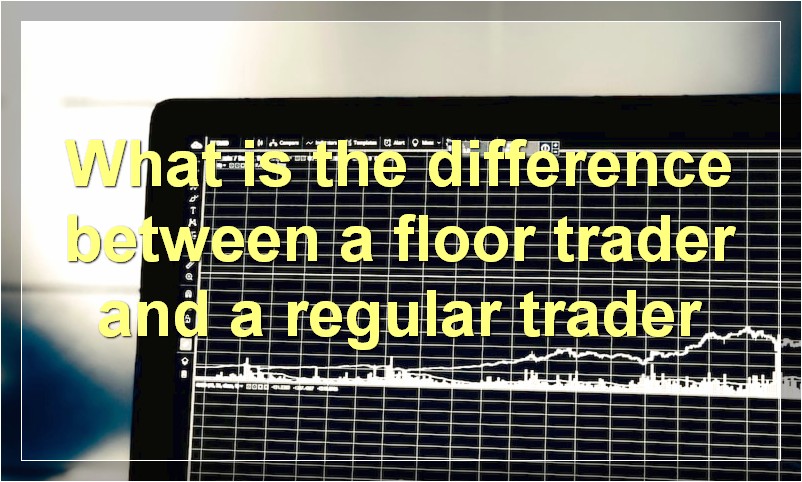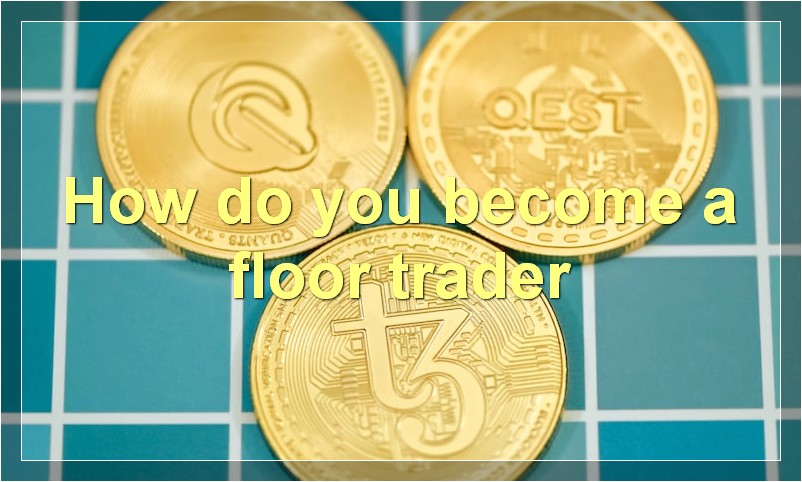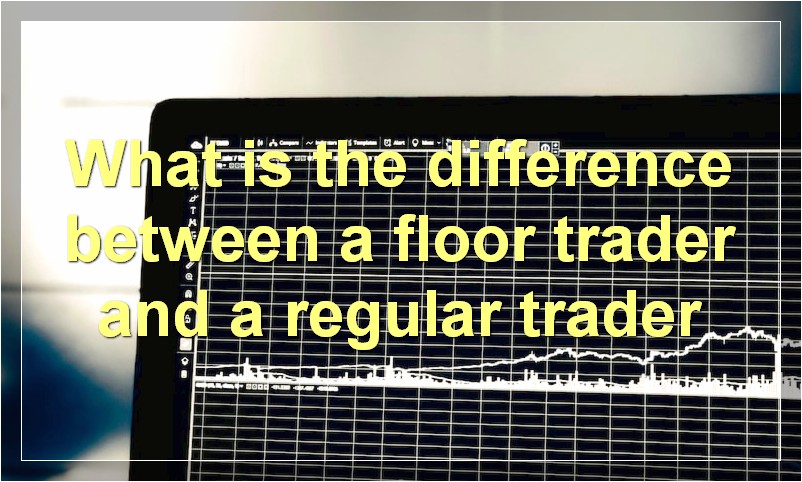In the world of finance, there are many different ways to make money. Some people invest in stocks, bonds, and other securities, while others trade commodities or currencies. floor traders are a special breed of trader who make their living by buying and selling securities at the physical location of a stock exchange.
So how do floor traders make money?
There are a few different ways. First, floor traders can earn commissions on the trades they execute. They may also earn fees for providing market information or acting as a middleman between buyers and sellers. Finally, floor traders may make money by buying securities at one price and selling them at a higher price.
Floor trading is a high-risk, high-reward profession. While floor traders can make a lot of money, they can also lose money just as easily. For this reason, it’s important to have a solid understanding of the financial markets before venturing into this career.
How do floor traders make money
Floor traders are a dying breed. In the past, these individuals made a living by buying and selling stocks on the floor of the stock exchange. They would buy stocks when they believed the price was low and sell them when the price increased.
Nowadays, with the advent of computerized trading, floor traders are no longer needed. However, there are still a few floor traders who make a living by working for firms that trade on the stock exchange. These firms use floor traders to execute trades and to provide liquidity to the market.
Floor traders make money by buying and selling stocks on behalf of their firm. When they buy a stock, they hope to sell it at a higher price in the future. If they are successful, they make a profit for their firm. If they are not successful, they lose money for their firm.
Floor traders are paid a salary by their firm and they also receive a commission on the trades that they execute. The commission is based on the value of the trade and it is usually a small percentage of the total value. For example, if a floor trader buys $100 worth of stock and sells it for $110, they will earn a $1 commission.
Floor traders typically work long hours and they must be able to make split-second decisions. They must also be very knowledgeable about the stock market and the companies whose stocks they trade.
What is the difference between a floor trader and a regular trader

A floor trader is a professional trader who buys and sells securities on the floor of the stock exchange. A regular trader is an investor who buys and sells securities through a broker.
How do floor traders trade
Floor traders are professional stock market traders who work on the floor of the exchange. They buy and sell stocks and other securities for their own account or on behalf of their firm’s clients. Floor traders must be approved by the exchange on which they wish to trade. To become a floor trader, an individual must have experience working in the securities industry and pass a series of exams.
Floor traders typically trade large blocks of shares and use sophisticated strategies. They may use information that is not available to other investors, such as order imbalances and large pending orders. Floor traders also have access to trading tools that are not available to other investors, such as real-time data on supply and demand.
Floor trading is a fast-paced and high-pressure environment. Floor traders must be able to make split-second decisions and execute trades quickly. They must also be able to keep track of multiple markets and understand complex financial concepts.
What is the job of a floor trader
A floor trader is a professional who buys and sells securities on the floor of an exchange. Floor traders are typically members of the exchange and have exclusive access to the trading floor. They use their knowledge of market conditions and order flow to buy and sell securities at the best possible price.
Do floor traders make more money than regular traders
Floor traders are professional traders who trade on the floor of an exchange. They are typically members of the exchange and have exclusive access to the trading floor. Floor traders make money by buying and selling securities, commodities, and other instruments on the floor of the exchange. They typically earn a commission on each trade that they make.
Regular traders are individuals who trade securities, commodities, and other instruments on an exchange. They do not have exclusive access to the trading floor and typically do not earn a commission on each trade. Regular traders may make money by buying and selling securities, commodities, and other instruments on an exchange.
How do you become a floor trader

In order to become a floor trader, you need to have a few things. First, you need to be comfortable with risk. Floor traders are constantly making split-second decisions that could mean either a large profit or a sizable loss. You also need to have quick reflexes and be able to think on your feet. Another important trait is being able to read people. Floor traders need to be able to read other traders in order to know when to make a move. Finally, you need to be comfortable with change. The markets are always changing, and floor traders need to be able to adapt quickly. If you have these qualities, then a career as a floor trader may be right for you.
What are the benefits of being a floor trader
There are many benefits to being a floor trader. For starters, you have the potential to make a lot of money. Floor traders typically earn a salary plus commissions, so your earning potential is unlimited. You also get to work in a fast-paced environment where you’re constantly making split-second decisions. This can be thrilling and exciting, and it’s a great way to learn about the financial markets. Additionally, working as a floor trader gives you access to information and resources that you wouldn’t have if you were working at a traditional financial institution. Finally, being a floor trader can be a great way to network and meet people in the financial industry.
What are the risks of being a floor trader
There are a number of risks associated with being a floor trader. Perhaps the most obvious is the risk of injury. Floor traders are constantly moving around the trading floor, and there is a risk of being hit by a flying object or tripping and falling. There is also the risk of losing money. Floor traders make split-second decisions and if they make a bad call, they can lose a lot of money very quickly. Finally, there is the risk of burnout. Floor trading is a very demanding job and it can be easy to become overwhelmed and burnt out.
What is the average salary of a floor trader
There is no definitive answer to this question as salaries can vary greatly depending on a number of factors, such as the size and location of the trading floor, the type of products traded, and the experience of the trader. However, according to an anonymous survey of floor traders conducted by efinancialcareers.com, the average salary for a floor trader in the United States is $100,000 per year. This figure includes bonuses and other forms of compensation, so it is likely that base salaries for floor traders start at a slightly lower figure.
What is the job outlook for floor traders
The job outlook for floor traders is not good. There are very few jobs available and the competition is fierce. The majority of floor traders are over the age of 55 and will soon be retiring. This leaves a small pool of talent to fill the few positions that are available.

